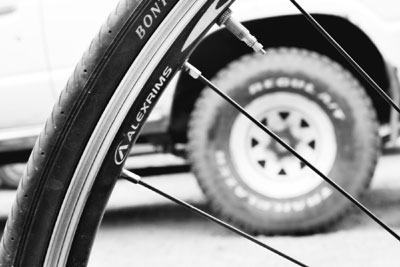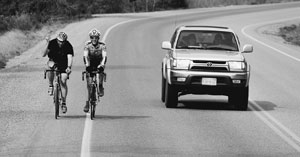|
| ||||
| Mending the road rift SideStory: Solving problems with ‘storytelling’
by Will Sands Friction between cyclists and motorists is nothing new for the Durango area. However, a local conflict-resolution group is hoping to ease tension on the roads of La Plata County. This week, the Braided River Mediation Center will hold an event to address the continued conflict between road riders and motorists on local roads. Braided River is a nonprofit restorative justice center that provides free conflict-resolution services to Southwest Colorado. Among the group’s goals is helping the Durango community with its larger conflicts. The rub between road riders and drivers recently rose to the top of the group’s list of concerns. “There are now so many cyclists on the road and so many more people driving as well,” said Bronson Fry, case manager with Braided River. “It basically comes down to motorists wanting to drive on roads without The Animas Valley, and County Roads 203 and 250, are of particular concern to Braided River. The two roads north of Durango have long been popular with cyclists and are also seeing increased population and growing traffic. “They’re very scenic rides and scenic drives, but when there is traffic, you begin to have issues,” Fry said. In an effort to bridge the gap between cars and bicycles, Braided River has enlisted the help of Daniel Horsey, a highly experienced mediator from Denver. This Thurs., April 26, Horsey will bring both sides together in an effort to heal the rift. Gaige Sippy, director of the Iron Horse Bicycle Classic and Durango Wheel Club member, will be on hand at the event. Sippy agreed that there are differences on the roads around Durango, but he believes cyclists and motorists can strike a compromise. “I’m in a unique position because I’m a cyclist, I live on County Road 203, I drive that road, and I’m the director of the Iron Horse,” Sippy said. “I think there are always going to be situations because both uses have grown dramatically in the last eight to 10 years. But I still think conflict is a strong word.” Though they do happen, incidents between riders and drivers are relatively few and do not get overly aggressive, according to Sippy. “I think there are a few isolated incidents out there, and they don’t involve people pulling over and getting into fights,” he said. “The fact is that there are cyclists doing things inappropriately out there, and there are cars doing things inappropriately. I think all it requires is a little give and take.”
The Iron Horse and Durango Wheel Club have both taken big steps to improve rider etiquette this year, according to Sippy. The groups have put a special emphasis on rider education and lightening the impacts of the Tuesday night Club Rides. “You definitely see people riding two or three abreast on County Road 203,” Sippy said. “You also see people driving 50 to 60 mph in a 35 mph zone. We certainly want to communicate that we need to ride responsibly out there. I hope the motorized community, which we’re all part of, can also do its part to help.” Sippy concluded that he looks forward to Thursday’s session, but was concerned that things might get out of hand. “I’m glad to hear people want to talk about it,” he said. “My fear is that it will turn into a fisticuffs. I think that the only answer is that we learn how to get along.” Robin George, of Four Corners Materials, is more than a motorist. Hauling gravel and fill on La Plata County’s roadways is his company’s lifeblood. George also plans on attending Thursday’s session, but unlike Sippy, he suggested that cyclists need to start giving a little more. “Their whole theory and slogan is ‘share the road,’ but they don’t share the road with us,” he said. “They’ll be two or three wide and they won’t give an inch. It makes it frustrating and dangerous. We have big trucks, and they’re in our lane. When it gets tight you have to hit the brakes to avoid running them over.” George added that he and other motorists earned their right to the road when they paid gasoline taxes and picked up license plates and registration. “My honest opinion is that bikes are not paying taxes or having to get plates and don’t have a right to use the roads,” he said. “If you ask me, you also don’t have the right to ride on a road without an adequate shoulder. It’s shocking to me that there aren’t more bike-to-vehicle accidents.” George concluded that he feels that local motorists are already sharing and already making sacrifices. Now it’s up to cyclists to do their parts. “They need to give a little, too,” he said. “It’s got to be give and take on both ends.” Thursday’s session should provide a good starting point to bridging this rift, according to Ellen Stein. Stein is a cycling advocate and recently took part in Braided River’s community mediation training. The first step is getting everyone at the table, she said. “I want to participate in creating the kind of community I want to live in,” Stein said. “Nothing’s going to change if we don’t talk to each other.” •
|
In this week's issue...
- December 18, 2025
- Let it snow
Although ski areas across the West have taken a hit, there’s still hope
- December 18, 2025
- Look, but don't take
Lessons in pottery theft – and remorse – from SW Colorado
- December 11, 2025
- Big plans
Whole Foods, 270 apartments could be coming to Durango Mall parcel



